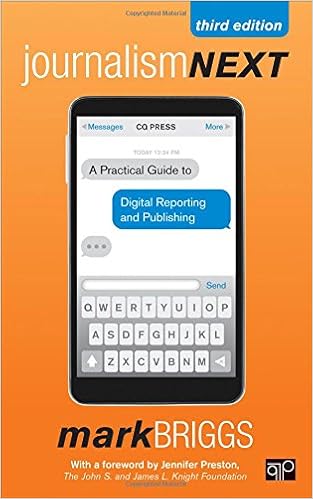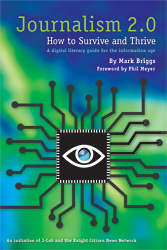
(NOTE: Following is a guest post from Julia Scott, who makes a living writing the savvy-spending blog, BargainBabe.com.)
Four months ago I gave up my job as a reporter, blogger and columnist at a mid-size newspaper to launch my own personal finance blog. I knew in my gut that this career path, though uncertain, held more promise.
I prepared for longer hours and brainstormed creative ways to make ends meet. But I didn’t account for a 180-degree shift in perspective about what it means to practice journalism in the Internet age.
My new perspective came about while attending an intense, week-long training program at the Knight Digital Media Center on the campus of the University of Southern California. I was one of 15 mid-career journalists eager to soak up the business skills needed to practice our craft independent of mainstream news organizations.
One of my main tasks at the program, called News Entrepreneur Boot Camp, was to craft a 15-second elevator pitch for my business, BargainBabe.com. I revised my pitch a dozen times before realizing I was using it to recruit new readers. But really, the purpose of the pitch was to land me a paying client.
It mattered less why people should read my blog than why businesses could make money by advertising on it. This was a hard nut to swallow. Here’s my pitch:
Does your business have enough customers? For many businesses, the answer is no. BargainBabe.com connects them with people who are ready to spend.
Independent journalists (the fancy term is news entrepreneur), must think as businessmen. My readers don’t pay me so my business side dictates they are no longer my primary focus. But for the journalist inside me, typing those words is sacrilege. For years I have endured long hours for little pay in the service of readers.
I am not dismissing the needs of my readers because without them I have nothing to offer paying customers. But my new perspective means I must balance the needs of my business with my calling as a journalist. For anyone else considering working as an independent journalist, walking this line will be one of your first challenges, too.
Transparency is essential, as is a commitment to produce high-quality content that meets reader needs. A willingness to spend as many hours – or more – developing your business as you do writing is also essential. My job is still creative, but oftentimes that means using my creativity to make money, not words.
Are you thinking about setting up your own business? If the answer is yes, you’re not alone. The pandemic may have laid waste to great swathes of industry, but it’s fueled an extraordinary surge in startups and new small businesses, as those laid off from affected firms explore new opportunities.
Reports from the U.S., Japan and across Europe show record-breaking levels of business registrations. [1] For example, figures from the U.S. Census Bureau show that new business registrations in July 2020 were 95 percent higher than during the same period in 2019. [2]
But what does it take to be a successful entrepreneur? Whether you’ve seen an exciting gap in the market, or feel forced to reassess your career following job loss, this article explores the skills you need to make it as an entrepreneur. It also signposts resources that you can use to develop the skills required for success, Read more.
What Are Entrepreneurial Skills?
Entrepreneurial skills are those normally associated with being an entrepreneur, although anyone can develop them.
Being an entrepreneur usually means starting and building your own successful business, but people with entrepreneurial skills can thrive within larger organizations, too.
Many researchers have studied entrepreneurial skills, but found no definitive answers. Some common themes are:
- Personal characteristics.
- Interpersonal skills.
- Critical and creative-thinking skills.
- Practical skills and knowledge.
Regardless of how you define it, entrepreneurship isn’t easy. So be prepared to do the “hard yards,” even after you’ve learned the skills we describe below.
The following sections examine each skill area in more detail, and look at some of the questions you’ll need to ask yourself if you want to become a successful entrepreneur.
The Personal Characteristics of an Entrepreneur
Do you have the mindset to be a successful entrepreneur? For example, entrepreneurs tend to be strongly innovative in outlook, and they may take risks that others would avoid.
Examine your own personal characteristics, values and beliefs, and ask yourself these questions:
- Optimism: Are you an optimistic thinker? Optimism is an asset, and it will help you through the tough times that many entrepreneurs experience as they find a business model that works for them.
- Initiative: Do you have initiative, and instinctively start problem-solving or business-improvement projects?
- Drive and persistence: Are you self-motivated and energetic? And are you prepared to work hard, for a very long time, to realize your goals?
- Risk tolerance: Are you able to take risks, and make decisions when facts are uncertain?
- Resilience: Are you resilient, so that you can pick yourself up when things don’t go as planned? And do you learn and grow from your mistakes and failures? (If you avoid taking action because you’re afraid of failing, our article, Overcoming Fear of Failure, can help you to face your fears and move forward.)
Entrepreneurial Interpersonal Skills
As an entrepreneur, you’ll likely have to work closely with others – so it’s essential that you’re able to build good relationships with your team, customers, suppliers, shareholders, investors, and other stakeholders.
Some people are more gifted in this area than others, but you can learn and improve these skills.
 Mark Briggs
Mark Briggs  Posted in
Posted in 





Amazing! Its in fact amazing paragraph, I have got much clear idea regarding from this paragraph.